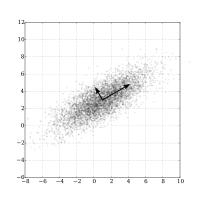
Photo from wikipedia
A common radar system calibration approach is to use civil aviation automatic dependent surveillance-broadcast (ADS-B) data to register errors. Considering the temporal and spatial uncertainties in radar system observation data,… Click to show full abstract
A common radar system calibration approach is to use civil aviation automatic dependent surveillance-broadcast (ADS-B) data to register errors. Considering the temporal and spatial uncertainties in radar system observation data, a specific iterative closest point (SICP) algorithm is proposed for estimating two-dimensional (2D) radar system errors. Radar system errors consist of the measurement deviations for the slant range and azimuth of the target and are spatially reflected by the difference between the observed and actual (ADS-B-observed) positions of the same target. Thus, the SICP algorithm is used to register the tracks corresponding to radar and ADS-B observation data. The radar system errors are reflected by a translation, rather than a rotation, of the observation data. Therefore, in the SICP algorithm, a unit matrix first replaces the rotation matrix in the iterative closest point (ICP) algorithm. Then, the translation matrix is iteratively calculated, and finally, the cumulant of the translation matrix is calculated as the radar system error. The proposed algorithm is advantageous because it does not require the temporal registration of radar and ADS-B observation data when temporal and spatial uncertainties are present (e.g., when 2D radar observation data have low accuracy and contain many outliers). Additionally, the SICP algorithm can effectively reduce the dependence on sensor data accuracy. The experimental results obtained based on simulated and measured data demonstrate that compared to conventional registration algorithms, the proposed algorithm can rapidly and accurately estimate radar system errors and has higher registration accuracy.
Journal Title: IEEE Access
Year Published: 2020
Link to full text (if available)
Share on Social Media: Sign Up to like & get
recommendations!